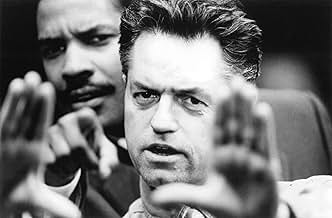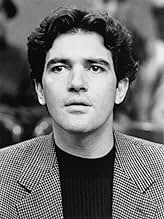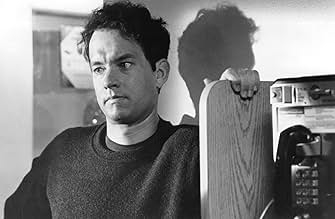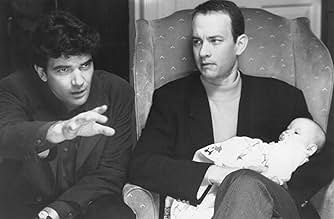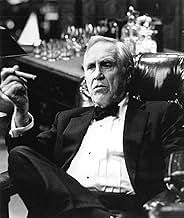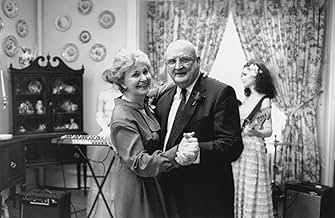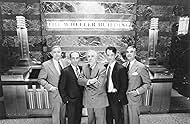Wenn ein Mann mit HIV von seiner Anwaltskanzlei wegen seines Zustands entlassen wird, stellt er einen homophoben Anwalt in kleiner Zeit als einzigen willigen Anwalt für eine rechtswidrige Kü... Alles lesenWenn ein Mann mit HIV von seiner Anwaltskanzlei wegen seines Zustands entlassen wird, stellt er einen homophoben Anwalt in kleiner Zeit als einzigen willigen Anwalt für eine rechtswidrige Kündigung ein.Wenn ein Mann mit HIV von seiner Anwaltskanzlei wegen seines Zustands entlassen wird, stellt er einen homophoben Anwalt in kleiner Zeit als einzigen willigen Anwalt für eine rechtswidrige Kündigung ein.
- 2 Oscars gewonnen
- 20 Gewinne & 23 Nominierungen insgesamt
- Rachel Smilow
- (as Stephanie Roth)
Empfohlene Bewertungen
Tom Hanks stars as Andrew Beckett, a hot-shot lawyer at one of the top law firms in Philadelphia. Despite having just been made an associate (a reward for excellent service), he suddenly finds himself fired. The firm uses an excuse--blaming a mistake he supposedly made on one recent case. But this would not account for the firing and he appears to have been fired because he's ill...suffering from AIDS. Beckett has a hard time finding a lawyer to take a wrongful termination case for him and he's too sick to do this alone. Eventually, he finds a rather homophobic lawyer (Denzel Washington) to take the case...and the second half of the film is the courtroom battle to bring justice to Andrew.
Unlike many films, this one was filmed sequentially. This was important to do because Tom Hanks starved himself and as the movie progresses, his weight loss and excellent make up made it appear as if he was suffering the progressive effects of the disease. Hanks truly put himself out for this role...and it's among the best things he's ever done. Apart from that, it's a well made film...worth seeing and very touching. It's also fascinating to watch to see how far thinking has come regarding gay people and HIV/AIDS.
This movie is probably the best drama regarding gay issues ever made. Remember, it was made in 1993, when AIDS was still a terminal disease, and it recalls the early days of an epidemic that may not square with the vision afforded today, but at the time, this was the reality of AIDS.
The entire crew is A-List. Tak Fujimoto, who would also film Silence of the Lambs and Sixth Sense, directed cinematography. Jonathan Demme, also of Silence of the Lambs fame, directs with typical honesty and grit. Bruce Springsteen and Neil Young contributed hauntingly touching original songs. Even Antonio Banderas, whom I never miss an opportunity to vilify, is moving as Hanks' devoted and supportive partner. Denzel Washington was well cast as the homophobic lawyer who ultimately takes Hanks' case, and Mary Steenburgen is surprising in an uncharacteristic villain role.
Ron Vawter, who played one of the lawyers in the firm from which Hanks was fired, and also appeared in Silence of the Lambs, was himself suffering from AIDS at the time of filming, and he eventually succumbed to it a few years later. His appearance in the film encapsulates the reality of the AIDS epidemic, in that it often touched our lives in unexpected places.
Although I have literally thousands of movies in my collection, I don't own this one. Not because I don't love it. I do. It's because I can't watch it without being overcome by emotion. Anyone who can watch Hanks' in the Opera scene, or hear Springsteen's or Young's eerie and melancholy ballads and not weep is dead inside. But in the end, Philadelphia is about life, and making it matter.
Wusstest du schon
- WissenswertesThe moment when Mary Steenburgen's character says that she hates the case was improvised in the moment, when the actress expressed her hate towards her role after shooting the mirror scene and Jonathan Demme encouraged her to incorporate it into the role, so the woman would seem more human.
- PatzerThe court stenographer doesn't seem to be actually typing, and the paper tape recording her keystrokes doesn't ever advance.
- Zitate
Joe Miller: Have you ever felt discriminated against at Wyatt Wheeler?
Anthea Burton: Well, yes.
Joe Miller: In what way?
Anthea Burton: Well, Mr. Wheeler's secretary, Lydia, said that Mr. Wheeler had a problem with my earrings.
Joe Miller: Really?
Anthea Burton: Apparently Mr. Wheeler felt that they were too..."Ethnic" is the word she used. And she told me that he said that he would like it if I wore something a little less garish, a little smaller, and more "American."
Joe Miller: What'd you say?
Anthea Burton: I said my earrings are American. They're African-American.
- Crazy Credits"This motion picture was inspired in part by Geoffrey Bowers' AIDS discrimination lawsuit, the courage and love of the Angius family and the struggles of the many others who, along with their loved ones, have experienced discrimination because of AIDS."
- Alternative VersionenThe cable and network television versions of Philadelphia edit out portions of the pharmacy scene where a gay University of Pennsylvania law student attempts to pick up Joe Miller. These two versions end this scene with the law student responding "Do I?" to Joe Miller's question concerning whether Miller looked gay. In the theatrical, home video and premium channel versions, Joe Miller continues to berate the law student with bigot remarks regarding homosexuals.
- VerbindungenEdited into Die Geschichte des erotischen Films (2004)
- SoundtracksStreets Of Philadelphia
Produced by Bruce Springsteen and Chuck Plotkin
Written and Performed by Bruce Springsteen
Courtesy of Columbia Records
Top-Auswahl
Details
- Erscheinungsdatum
- Herkunftsland
- Sprache
- Auch bekannt als
- Filadelfia
- Drehorte
- Produktionsfirmen
- Weitere beteiligte Unternehmen bei IMDbPro anzeigen
Box Office
- Budget
- 26.000.000 $ (geschätzt)
- Bruttoertrag in den USA und Kanada
- 77.446.440 $
- Eröffnungswochenende in den USA und in Kanada
- 143.433 $
- 26. Dez. 1993
- Weltweiter Bruttoertrag
- 206.678.440 $
- Laufzeit2 Stunden 5 Minuten
- Farbe
- Sound-Mix
- Seitenverhältnis
- 1.85 : 1
Zu dieser Seite beitragen







